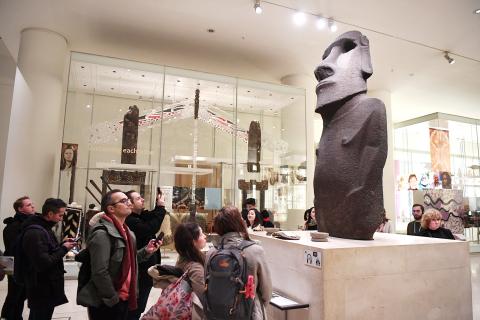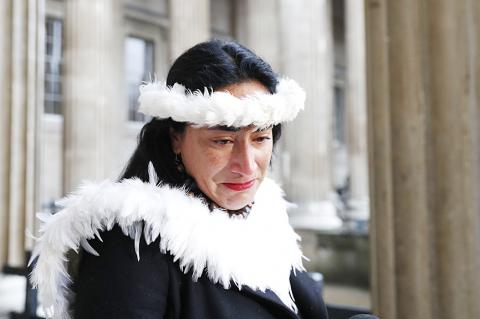The governor of Easter Island on Tuesday tearfully begged the British Museum to return one of its famous statues, saying: “Give us a chance so he can come back.”
The museum in London has held the Hoa Hakananai’a, one of the most spiritually important of the island’s stone monoliths, for 150 years.
“My grandma, who passed away at almost 90 years, she never got the chance to see her ancestor,” Easter Island Governor Tarita Alarcon Rapu said after meeting museum officials, accompanied by Chilean Minster of National Assets Felipe Ward. “I am almost half a century alive and this is my first time.”

Photo: EPA-EFE
The moai (statue) is one of hundreds originally found on the island. Carved by Polynesian colonizers, each of the big-headed figures was considered to represent tribal leaders or deified ancestors.
It was an emotional moment for the indigenous Rapa Nui visitors when they saw the basalt statue, which for them, contains the spirit of their people.
The 2.4m monolith weighs 4 tonnes.

Photo: AFP
“I believe that my children and their children also deserve the opportunity to touch, see and learn from him,” Rapu said, with tears in her eyes. “We are just a body. You, the British people, have our soul.”
Hoa Hakananai’a was taken without permission in 1868 by the British frigate HMS Topaze, captained by Richard Powell, and given to then-queen Victoria.
The Rapa Nui people, who last year gained self-administration from Chile over their ancestral lands on Easter Island, have launched a campaign to recover what they consider as one of the most important statues of the nearly 900 scattered across the South Pacific island.
With its scowling eyes, straight-lined mouth and paunchy profile, the monolith stands at the entrance to a gallery in the British Museum.
The moai is distinguished by carvings on the back depicting the island’s birdman cult and other ceremonial aspects of Easter Island’s enigmatic past.
The Rapa Nui believe it brought peace to the island, around the year 1000, ending inter-tribal wars.
After the meeting, Ward said he was optimistic, but cautioned that the campaign for the return of the statue would be a long one.
“This is the first of many conversations we will have,” he told reporters at the museum. “We are looking forward to the next, and probably the second one will be in Rapa Nui [Easter Island], where we invited the authorities of the museum.”
It is the first time that the museum has agreed to hold talks about the statue, but on Tuesday British Museum officials were talking only of a loan, not the return, of the artefact.
“The museum is one of the world’s leading lenders and the trustees will always consider loan requests subject to usual conditions,” a spokeswoman said.

Nauru has started selling passports to fund climate action, but is so far struggling to attract new citizens to the low-lying, largely barren island in the Pacific Ocean. Nauru, one of the world’s smallest nations, has a novel plan to fund its fight against climate change by selling so-called “Golden Passports.” Selling for US$105,000 each, Nauru plans to drum up more than US$5 million in the first year of the “climate resilience citizenship” program. Almost six months after the scheme opened in February, Nauru has so far approved just six applications — covering two families and four individuals. Despite the slow start —

YELLOW SHIRTS: Many protesters were associated with pro-royalist groups that had previously supported the ouster of Paetongtarn’s father, Thaksin, in 2006 Protesters rallied on Saturday in the Thai capital to demand the resignation of court-suspended Thai Prime Minister Paetongtarn Shinawatra and in support of the armed forces following a violent border dispute with Cambodia that killed more than three dozen people and displaced more than 260,000. Gathered at Bangkok’s Victory Monument despite soaring temperatures, many sang patriotic songs and listened to speeches denouncing Paetongtarn and her father, former Thai prime minister Thaksin Shinawatra, and voiced their backing of the country’s army, which has always retained substantial power in the Southeast Asian country. Police said there were about 2,000 protesters by mid-afternoon, although

MOGAMI-CLASS FRIGATES: The deal is a ‘big step toward elevating national security cooperation with Australia, which is our special strategic partner,’ a Japanese official said Australia is to upgrade its navy with 11 Mogami-class frigates built by Japan’s Mitsubishi Heavy Industries, Australian Minister for Defence Richard Marles said yesterday. Billed as Japan’s biggest defense export deal since World War II, Australia is to pay US$6 billion over the next 10 years to acquire the fleet of stealth frigates. Australia is in the midst of a major military restructure, bolstering its navy with long-range firepower in an effort to deter China. It is striving to expand its fleet of major warships from 11 to 26 over the next decade. “This is clearly the biggest defense-industry agreement that has ever

DEADLY TASTE TEST: Erin Patterson tried to kill her estranged husband three times, police said in one of the major claims not heard during her initial trial Australia’s recently convicted mushroom murderer also tried to poison her husband with bolognese pasta and chicken korma curry, according to testimony aired yesterday after a suppression order lapsed. Home cook Erin Patterson was found guilty last month of murdering her husband’s parents and elderly aunt in 2023, lacing their beef Wellington lunch with lethal death cap mushrooms. A series of potentially damning allegations about Patterson’s behavior in the lead-up to the meal were withheld from the jury to give the mother-of-two a fair trial. Supreme Court Justice Christopher Beale yesterday rejected an application to keep these allegations secret. Patterson tried to kill her